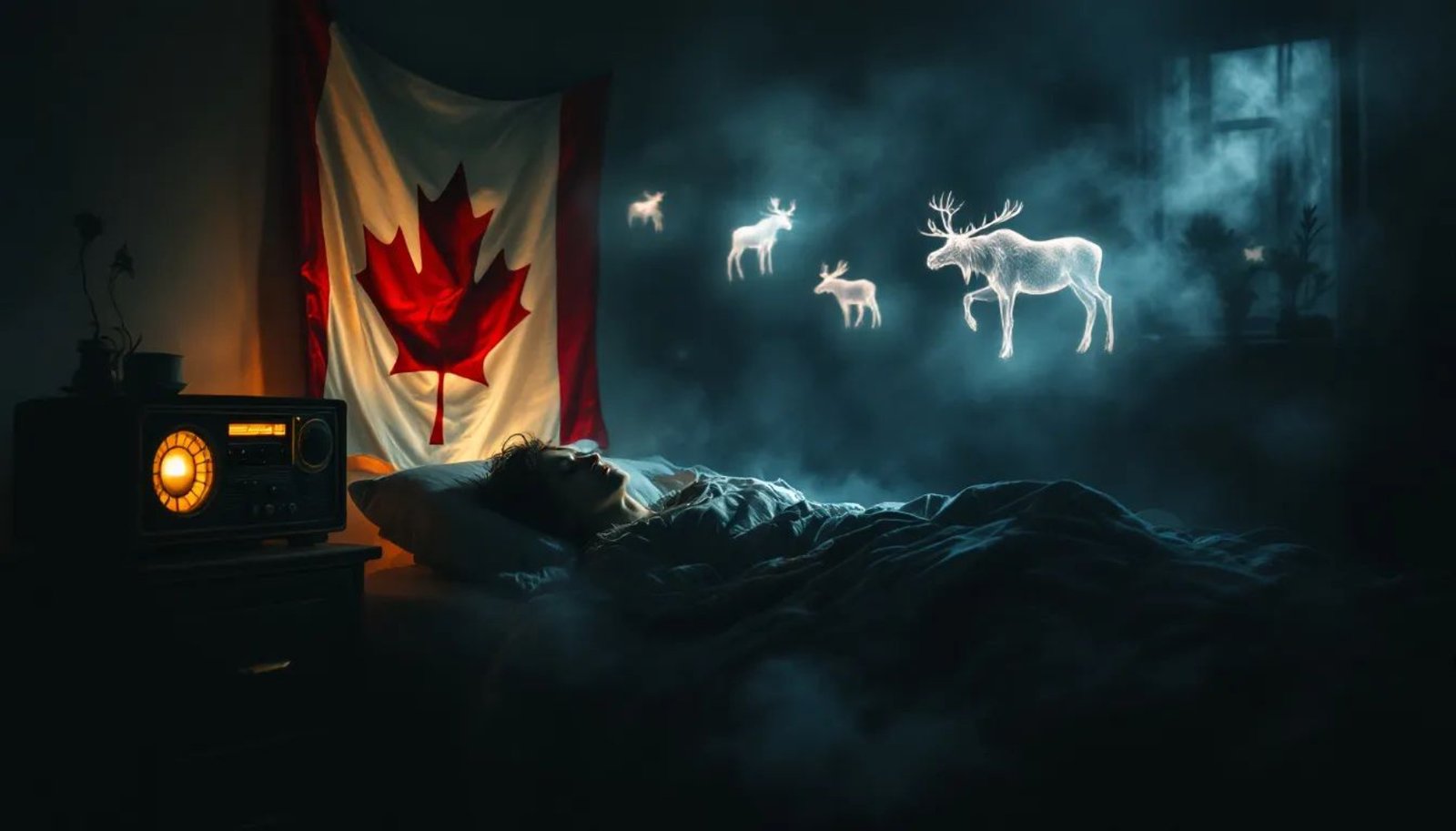🚨 Disclaimer: The Maple Curtain is a satirical publication—nothing here is real, including our so-called journalists. Take it easy, eh? 🍁

Is the CBC Using Subtle Moose Noises to Control Our Dreams?
Is the CBC embedding moose sounds into late-night broadcasts to control your dreams? A growing number of Canadians say yes—and they have mysterious audio clips to prove it.
📝 By Dale Clucken – Somewhere off grid
CANADA – A new conspiracy theory gaining traction online claims that the CBC—yes, that CBC—is embedding barely audible moose sounds into its late-night programming to influence Canadians while they sleep.
The theory first appeared in a 4-hour YouTube video titled “Project Antler: The Truth Behind the Broadcast”, which was posted by conspiracy forum user @MapleMaverick88, who claims to be a former “sound intern” for CBC’s archival division (though his only proof is a lanyard that says ‘Volunteer – 1997’).
“Why do you wake up craving flapjacks and nationalism after falling asleep to CBC Radio One?” asks the video’s voiceover. “Why do you dream about snow, polite arguments, and Gordon Lightfoot? Wake up, sheeple. Or should I say… mooseple.”
The Allegations: A Moose in the Machine
According to the theory, CBC Radio and TV have been embedding low-frequency moose vocalizations—called “merrrrrh” frequencies—into programming between 2 a.m. and 5 a.m., coinciding with prime dream-state hours.
Alleged goals of the subliminal moose campaign include:
🦌 Boosting national loyalty through subconscious exposure to “antler-coded messaging”
🦌 Promoting increased consumption of butter tarts, plaid shirts, and Tragically Hip albums
🦌 Preventing Canadians from moving to the U.S. by reinforcing feelings of “snowbound contentment”
“It’s genius,” said underground theorist Randy “The Snow Prophet” Leclair. “They use moose calls layered under CBC’s soothing jazz and late-night interviews. That’s why no one questions why they still fund it. You’re dreaming about a moose giving you financial advice, and you wake up thinking, ‘Yeah, the CBC should get another $1.4 billion.’”
Evidence? You Bet There’s Questionable Audio Clips
Supporters of the theory have compiled “evidence” including:
🔊 A slowed-down clip of Ideas with Nahlah Ayed that allegedly contains a background “snuffling” sound consistent with a bull moose inhaling through his nose
🔊 A 1993 rerun of The Nature of Things where a moose “just stares directly into the camera for too long”
🔊 Archived test patterns from the 1980s where moose silhouettes allegedly flash at subliminal speeds
Conspiracy forums now include user-submitted dream journals describing:
- Being chased through the woods by Peter Mansbridge
- A talking moose calmly explaining public broadcasting
- Intense urges to visit Banff without explanation
CBC Responds: Kind of?
When asked for comment, the CBC’s official reply was:
“We do not embed wildlife audio into our programming unless it is part of a scheduled documentary or regional news segment. And if we did, moose would be an excellent choice.”
A former producer, who wished to remain anonymous, added:
“Honestly, that would explain a lot about our holiday ratings spikes. But no, it’s just a lot of soft music, mild conversation, and accidentally hypnotic pauses.”
Experts Call It “Ludicrous”—Which Is Exactly What They Want You to Think
Media analysts have dismissed the theory as absurd.
🎓 “Moose noises don’t work like that,” said Dr. Tonya Chilvers, an audio researcher at the University of Ottawa. “They’re loud, weird, and mostly involve screaming during mating season. You’d know if it was happening.”
But conspiracy believers aren’t convinced.
🗣️ “That’s what they WANT you to think,” said @WokeInWaskaganish, who now wears antler-shaped tinfoil at night to block transmissions.
Public Reaction: Mostly Confused but Polite
🗣️ “I did fall asleep watching The National and woke up with an urge to make bannock,” admitted one man from Whitehorse.
🗣️ “Is this why my dreams keep switching from curling to beavers without warning?” asked a woman from Lethbridge.
🗣️ “If the moose are whispering in my sleep, can they also tell me where I parked?” – Derek, Ottawa
The Takeaway: Trust No One, Especially the CBC Moose
Whether this theory holds any weight—or antlers—remains unclear. But one thing’s certain:
Canadians will now be listening very closely to the sound of late-night radio, and every unexplained grunt in the background of a rerun will fuel further speculation.At press time, CBC had announced a new wildlife segment titled “Voices of the Forest,” prompting conspiracy theorists to scream, “SEE?!”

